Have you heard of a ferret exercise ball?
Does your ferret need it?
Here I will share with you information about ferret exercise balls. Everything you need to know about them is listed in my post below. So, if you are wondering what are they, are they good for ferrets, and should you use them or not, then I recommend continuing reading.
TABLE OF CONTENTS
What Is A Ferret Exercise Ball?
A ferret exercise ball is actually a small ball made of plastic and you can put a ferret inside. It comes with a big hole and a lid so you can close it. The big lid on the ball keeps the ferret inside so he can’t escape unless you let him out. Also, the ball has linear holes all around so your ferret can breathe.
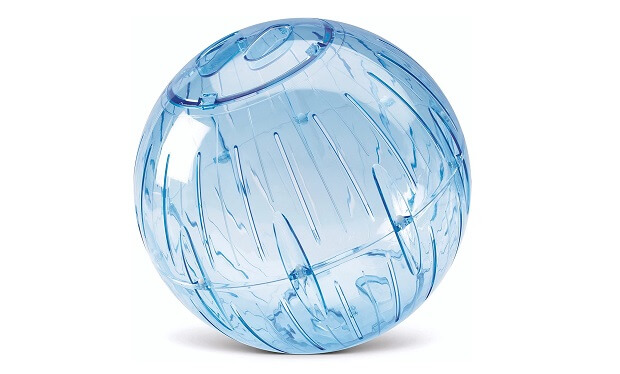
So, basically, a large ferret exercise ball is identical to the hamster ball, only a few times bigger. Yes, that means you have to put your ferret inside the ball so your ferret can roam around your home without getting into trouble or slipping under the couch.
Why Would You Use This Ball?
The purpose of this ball is to prevent the animal inside the ball to get injured. This ball protects the animal from other animals or from entering small gaps like under the door, behind an appliance, etc. This is not a common item for ferret parents, but there are some small animals like hamsters or rats that use it more.
Can Ferrets Use Exercise Balls?
It is not recommended to use an exercise ball with your ferret. When ferrets explore, they love to sniff, touch, walk, jump, go into tight spaces, etc. If you put a ferret in an exercise ball, you will remove every fun in the word “explore” for ferrets. But, this is not the only reason for you to avoid ferret exercise balls.
Ferrets Don’t Know How To Use It
If you put a ferret in the ball, at first, your ferret won’t be able to walk. The first few minutes he will probably sit and sniff the new environment. Eventually, he will try to get out so he will roll around instead of walking. After a few tries he will probably figure out how to walk in it and then the next problem happens.
Ferrets Will Get Bored Inside
If your ferret knows how to walk in the ball, he will cooperate for a few minutes. But, as I have already mentioned, he can’t sniff or touch anything and that can result in frustration. When your ferret figures that he can’t touch anything due to the ball, there are two things he can do. First, he will try to get out which means a lot of scratching and rolling, not in a fun way. The second is that he will stop moving, lay in the ball and that is it.
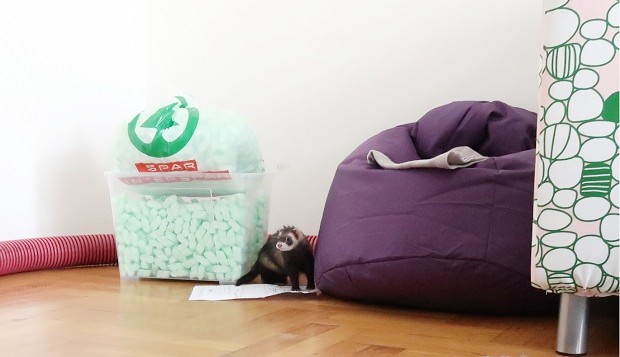
Ferret Can Get Hurt
When a ferret wants to get out (or get in), he scratches. Scratching is their number one solution for most problems. So, if your ferret starts scratching inside the ball, his nail can get stuck in the gap (air hole), and that can lead to an injury. He can pull out his nail, hurt his paw and that is not something you want your ferret to experience.
The Ball Is Not Comfortable
Besides hurting his nails, your ferret isn’t comfortable in the ball. Most exercise balls, even the large ferret balls are too small for ferrets. That means your ferret will have to arch his back in an unnatural way. If he does that for a long time, he will experience pain in the back or even hurt his back.
Ferret Can’t Go Potty
Ferrets poop a lot. Their digestive system is fast and they have to poop every few hours. That is why it is recommended to put a litter box in the cage and in every room your ferret has access to. If you close a ferret in a small plastic ball and you aren’t sure when he pooped the last time, he could do it inside. If that happens you will have a dirty ball, dirty room, and dirty ferret. Their poop isn’t dry and it doesn’t look like a small pebble as in other small animals.
Ferrets Can Get Too Hot
You have to remember that this is a plastic ball with small holes for air. That means if you put a ferret inside on a sunny and hot day, your ferret can easily become too hot. That means he can even experience heat stroke which is a serious issue. If you want to know signs of heatstroke, read my post about heatstroke in ferrets.
Do Ferrets Like Exercise Balls?
There are two ways a ferret uses an exercise ball. The first is if you leave the ball open and the second is if you close the ball. If you leave the ball open, your ferret will enter the ball, sniff inside and exit or lay down for a nap. If you close the ball with your ferret inside, 90% of the time your ferret will try to get out. So, I would say that this is not their favorite toy, which is logical since it is not recommended for them.
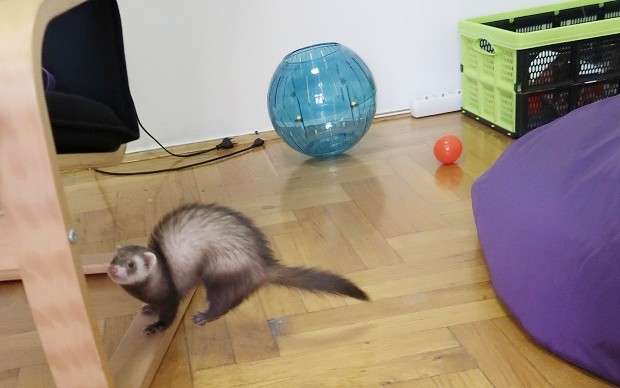
Exercise Ball Alternatives
If you have to put your ferret in an enclosure when you are, for example, cleaning his cage, you don’t have to use exercise balls. Since it is not recommended to use ferret exercise balls, there are a few alternatives you can use to keep your ferret under control when you can’t monitor him. I have listed the best alternatives with their advantages, but with tips for choosing the right one.
Ferret Playpen
A ferret playpen is the best alternative if you have to keep your ferret under control. Playpens keep your ferret under control and they provide him enough space to explore, sniff and touch things. You can get a playpen made of fabric and made of wire. If you decide to get a fabric playpen, get the one with the roof to keep ferrets from climbing up. If you decide to get a wired playpen, make sure that the wires are vertical so your ferret can’t climb over the walls and escape. Also, keep in mind that the wire gap should be around an inch, not more so he can’t escape through the gap.
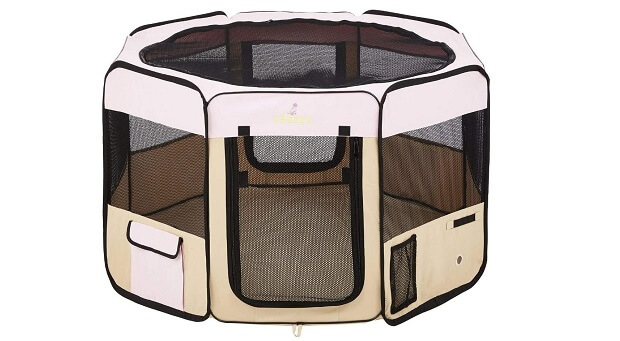
Ferret Transporter
If the time your ferret has to be confined is short, you can use a transporter too. It is a good idea to use a transporter because your ferret is used to it. You use a transporter when you are going on a trip, to the vet, etc so your ferret knows how to act in it. Also, you can put a litter box inside, a few bowls with food and water, even a blanket. It might not be a big as a playpen, but it is much bigger and more comfortable than the exercise ball.
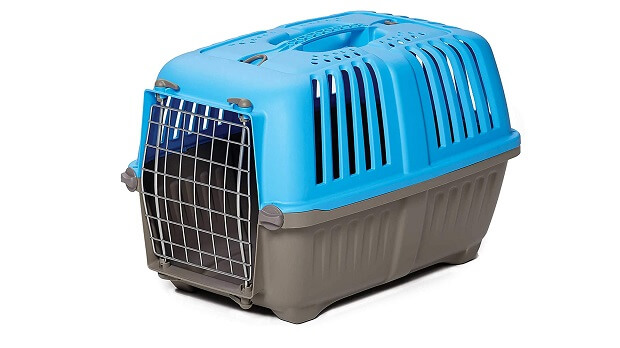
Ferretproof Your Home
Ferretproofing is something you must-do if you have a ferret. Ferretproofing helps you in many ways and if you ferret proof your home, it means you can let your ferret free roam. That means you don’t have to use a playpen, transporter, or any other method to keep your ferret contained. If you want to see practical tips and advice on ferret proofing, read my post about ferret proofing rooms in your home.
Conclusion
Although it seems comical to see a ferret in an exercise ball on the internet videos, it is not a good idea to actually do that. You can seriously hurt your ferret with that action and that is why it is not recommended to use them, no matter how short the time spent inside is. Ferrets are energetic animals and it is their job to run around, investigate and steal things. Our job is to keep them safe while they are doing that, without exercise balls in the picture. Do you agree with us? What do you think about ferret exercise balls? Share your thoughts with us below!


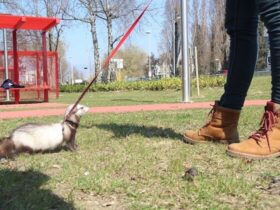









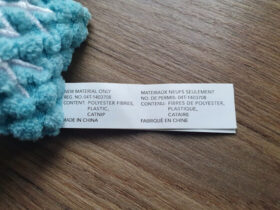




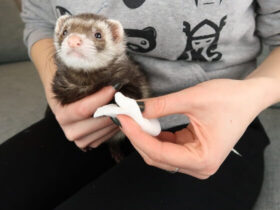

Leave a Reply